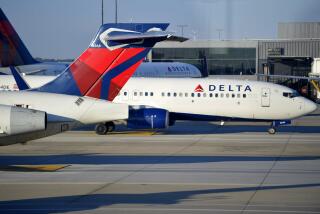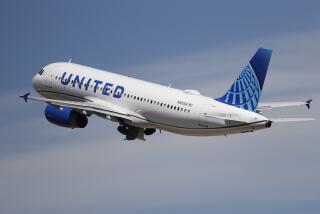Ruling Lets Arab American Sue Airline
- Share via
Airlines have a legal right to remove passengers who pose a security threat, but that doesn’t entitle them to discriminate on the basis of race, ethnicity or national origin, a Los Angeles federal judge declared Friday.
U.S. District Judge Florence-Marie Cooper ruled that Assem Bayaa, an American citizen of Arab descent, can pursue his civil rights lawsuit against United Airlines.
Bayaa, who lives in Irvine, was removed from a United flight at Los Angeles International Airport on Dec. 23 as it was about to take off for New York.
When he asked why, Bayaa said, the airline’s ground security chief told him, “Because the crew doesn’t feel comfortable having you on board.”
Bayaa’s ticket listed his ultimate destination as Riyadh, Saudi Arabia, where he worked as an audit manager for Arthur Andersen.
United offered to put him on the next New York flight, but Bayaa refused, traveling instead on another carrier.
His lawsuit, filed by the American Civil Liberties Union, seeks an injunction barring United from engaging in a “pattern and practice” of discrimination against Arab Americans.
The airline moved to have the suit thrown out, arguing that complying with federal and state civil rights laws might conflict with the duty of flight crews to determine if a passenger poses a security threat.
“There is no merit to this argument,” Cooper said in her ruling. “The defendant’s duty does not grant them a license to discriminate.”
“This is a great victory,” said ACLU attorney Ben Wizner. “The airline’s extreme argument was that even if all of our allegations of discrimination were true, federal courts were powerless to intervene.”
United’s attorneys also contended that the 1934 Warsaw Convention limiting damage claims against international carriers barred Bayaa from pursuing his legal action. But Cooper noted that Bayaa was not asking for monetary damages, only an injunction.
Cooper did grant the airline’s request to dismiss the American-Arab Anti-Discrimination Committee as a co-plaintiff in the suit, ruling that the group could not show that its members had been harmed by the airline’s actions.
The league contended that Arab Americans have been subjected to a “new and disturbing pattern of discrimination” by U.S. airlines since the terrorist attacks of Sept. 11, 2001. It cited 60 alleged incidents of discrimination against Arab American airline passengers in the past year.
Bayaa’s suit is one of four similar cases filed by the ACLU across the nation.
More to Read
Inside the business of entertainment
The Wide Shot brings you news, analysis and insights on everything from streaming wars to production — and what it all means for the future.
You may occasionally receive promotional content from the Los Angeles Times.










